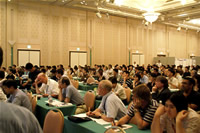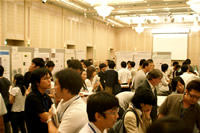

The 3rd International Symposium on Protein Community (ISPC-Nara2010) was held from September 13-16 at the Hotel Nikko Nara in relation to the CREST research theme "Metabolism-based Regulation of Organelle Homeostasis and Cell Function" (represented by Professor Yukio Fujiki, Kyushu University Faculty of Sciences, CREST research area "Basic Technologies for Controlling Cell Functions Based on Metabolic Regulation Mechanism Analysis"). The symposium was jointly held by the Ministry of Education, Culture, Sports and Technology Priority Research Area "Protein Community" and the Nara Institute of Science and Technology Global COE Program "Frontier Biosciences: Strategies for Survival and Adaptation in a Changing Global Environment".
This was a large-scale symposium with over 300 participants. Following the opening address from Professor Toshiya Endo of Nagoya University, representative researcher of the research area "Protein Community", 47 lectures (including 19 by invited speakers from overseas) and 137 poster presentations were given.
Comprehensive lectures related to cell function regulation were given by both Japanese and foreign researchers active in the front lines of research, over the course of 12 sessions which were generally classified under the following topics: protein translocation and transport, quality control and unfolded protein response, protein folding and chaperones, protein aggregation and disease, and organelle dynamics. These sessions included lively discussions.
In particular, presentations related to protein translocation and transport mechanisms in what was held as the JST-CREST sessions began with Professor Yukio Fujiki of Kyushu University speaking on the latest research results on peroxisome biogenesis mechanisms and peroxisome homeostasis. Following that, Professor Ralf Erdmann of Ruhr-Universität Bochum, Germany, presented results of detailed analysis regarding membrane transport mechanisms of peroxisome matrix proteins and proposed a new transport mechanism model based on that work. Professor Ramanujan Hegde of the NIH, USA, provided an explanation of mechanisms of translocation into the endoplasmic reticulum of C-tail anchored membrane proteins and quality control of same. Professor Masao Sakaguchi of the University of Hyogo introduced the significance of positively charged residues from translocation of newly-synthesized proteins into the endoplasmic reticulum via translocon. Professor Gunnar von Heijne of Stockholm University, Sweden, presented new insights into selectivity of insertion into the endoplasmic reticulum from the results of experiments involving comprehensive amino acid substitution in portions of transmembrane helices using endoplasmic reticulum localization model membrane proteins.
This international symposium was a rare event in that we met all the top flight international researchers in their respective fields, including Professor Walter Neupert of the University of Munich, Germany, Professor Ulrich Hartl of the Max Planck Institute, Germany, Professor Peter Walter of the University of California, San Francisco, USA, and others. As just one result, we were able to gather and exchange much new information related to organelle homeostasis, including proteostasis and degradation, chaperones, and so on, which should contribute to the furtherance and development of the actual CREST research theme. Also, 137 poster presentations were given in the afternoons of the first and second days, and postdocs, graduate students, and other younger researchers could be seen engaging in enthusiastic discussions with lecturers, particularly those invited from overseas. Furthermore, 4 outstanding poster presentations were selected and recognized with poster awards during the closing ceremonies.
JST, an integrated organization of science and technology in Japan, establishes an infrastructure for the entire process from the creation of knowledge to the return to the society. For more information, visit http://www.jst.go.jp/EN/